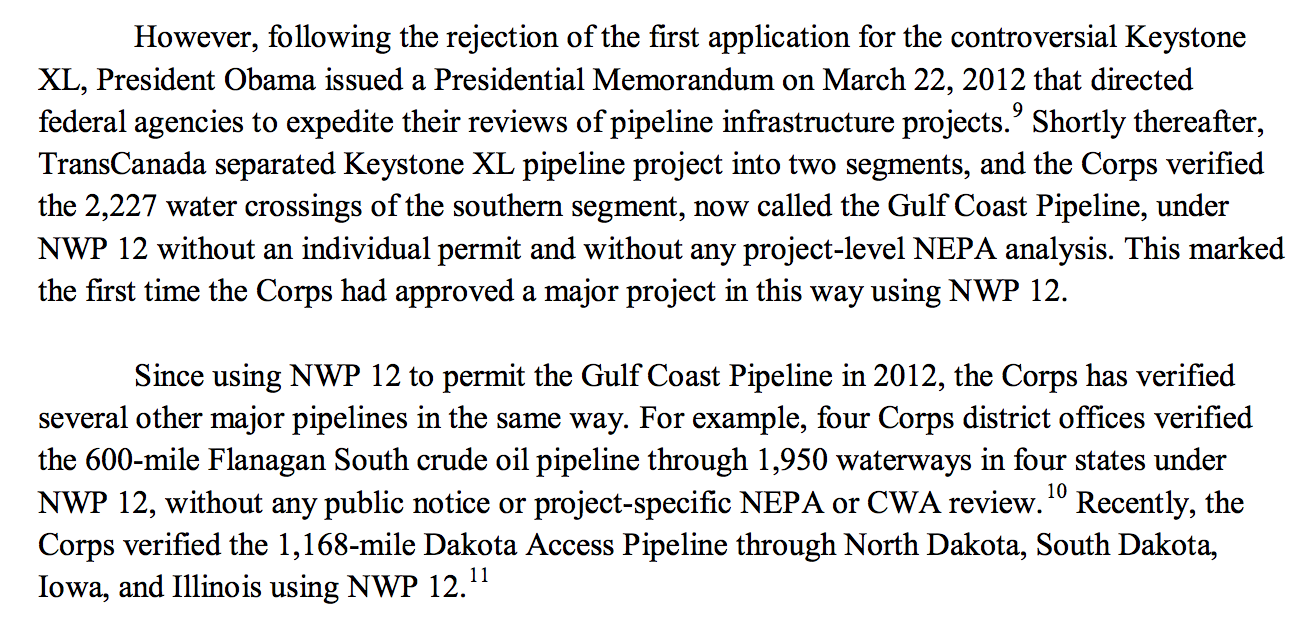In the two months leading up to the U.S. Army Corps of Engineers’ decision to issue to the Dakota Access pipeline project an allotment of Nationwide 12 permits (NWP) — a de facto fast-track federal authorization of the project — an army of oil industry players submitted comments to the Corps to ensure that fast-track authority remains in place going forward.
This fast-track permitting process is used to bypass more rigorous environmental and public review for major pipeline infrastructure projects by treating them as smaller projects.
Oil and gas industry groups submitted comments in response to the Corps’ June 1 announcement in the Federal Register that it was “requesting comment on all aspects of these proposed nationwide permits” and that it wanted “comments on the proposed new and modified NWPs, as well as the NWP general conditions and definitions.” Based on the comments received, in addition to other factors, the Corps will make a decision in the coming months about the future of the use of the controversial NWP 12, which has become a key part of President Barack Obama’s climate and energy legacy.
Beyond Dakota Access, the Army Corps of Engineers (and by extension the Obama Administration) also used NWP 12 to approve key and massive sections of both Enbridge’s Flanagan South pipeline and TransCanada’s southern leg of the Keystone XL pipeline known as the Gulf Coast Pipeline. Comments submitted as a collective by environmental groups, such as the Sierra Club, National Wildlife Federation, several 350.org local chapters, the Center for Biological Diversity, WildEarth Guardians, Corporate Ethics International, and others, allege NWP 12 abuses by the Obama administration.
Image Credit: Regulations.gov
The groups say NWP was never intended to authorize massive pipeline infrastructure projects and that that kind of permitting authority should no longer exist. Instead, they argued in their August 1 comment, federal agencies should be required to issue Clean Water Act Section 404 permits and do a broader environmental review under the National Environmental Policy Act (NEPA).
“Simply put, the Congress did not intend the NWP program to be used to streamline major infrastructure projects like the Gulf Coast Pipeline, the Flanagan South Pipeline, and the Dakota Access Pipeline,” reads their comment. “For the reasons explained herein, we strongly oppose the reissuance of NWP 12 and its provisions that allow segmented approval of major pipelines without any project-specific environmental review or public review process.”
“Oil companies have been using this antiquated fast-track permit process that was not designed to properly address the issues of mega-projects such as the Dakota Access pipeline,” Dallas Goldtooth of the Indigenous Environmental Network stated in the environmental groups’ press release at the closing of the NWP 12 comment period. “Meanwhile, tribal rights to consultation have been trampled and Big Oil is allowed to put our waters, air and land at immense risk. This cannot continue, it’s time for an overhaul.”
Industry groups, on the other hand, made their own arguments for the status quo.
Industry: Keep NWP 12 Alive, Presidential Campaign Ties
Many industry groups chimed in on the future of NWP 12. They included the American Petroleum Institute (API), Ohio Oil and Gas Association, West Virginia Oil and Natural Gas Association, Louisiana Mid-Continent Oil and Gas Association, the Baker Botts Texas Industry Project (a who’s who of petrochemical corporations such as Halliburton, ExxonMobil, Shell Oil, Chevron, Marathon Petroleum, Kinder Morgan, and BP, as of 2008), coal and natural gas utility company Southern Company, and others.
One of those other commenters was the Domestic Energy Producers Alliance (DEPA), a lobbying and advocacy consortium spearheaded by Harold Hamm, founder and CEO of hydraulic fracturing (“fracking”) giant Continental Resources, as well as energy aide to the Donald Trump presidential campaign and potential future U.S. Secretary of Energy.
Continental Resources, as reported by DeSmog, will send some of its oil through Dakota Access and previously signed a shipping contract for the Keystone XL pipeline.
“DEPA applauds the Corps for its efforts to reissue the NWPs as they are an important regulatory vehicle to authorize activities that have minimal individual and cumulative adverse environmental effects under the Clean Water Act, Section 404 Program,” wrote DEPA. “These permits are critical to DEPA’s members in their day to day operations.”
Another commenter was Berkshire Hathaway Energy, a “most of the above” energy sources utility company (including coal and natural gas) owned by Warren Buffett’s Berkshire Hathaway holding company. Buffett serves as a fundraiser for Hillary Clinton’s presidential campaign.
“Berkshire Hathaway Energy supports the Corps’ intention to issue NWPs,” wrote Berkshire Hathaway Energy. “The continued implementation of the NWPs is essential to the ongoing operation of Berkshire Hathaway Energy’s businesses — particularly in circumstances when timely service restoration is critical.”
Obama “Climate Test” Guidelines
On August 1, 2016, the day the commenting period closed for the future of NWP 12 and just days after the Army Corps issued a slew of NWP 12 determinations for Dakota Access, the Obama White House’s Council on Environmental Quality (CEQ) issued a 34-page guidance memorandum, which could have potential implications for the environmental review of projects like Dakota Access.
That memo, while non-binding, calls for climate change considerations when executive branch agencies weigh what to do about infrastructure projects under the auspices of NEPA.
“Climate change is a fundamental environmental issue, and its effects fall squarely within NEPA’s purview,” wrote CEQ. “Climate change is a particularly complex challenge given its global nature and the inherent interrelationships among its sources, causation, mechanisms of action, and impacts. Analyzing a proposed action’s GHG [greenhouse gas] emissions and the effects of climate change relevant to a proposed action — particularly how climate change may change an action’s environmental effects — can provide useful information to decision makers and the public.”
NWP 12 does not receive mention in the memo. Neither does Dakota Access, Keystone XL, nor Flanagan South.
The non-binding guidance, which some have pointed to as an example of the Obama White House applying the “climate test” to the permitting of energy infrastructure projects, has been met with mixed reaction by the fossil fuel industry and its legal counsel.
The Center for Liquefied Natural Gas, a pro-fracked gas exports group created by API, denounced the CEQ memo. So too did climate change denier U.S. Sen. James Inhofe (R-OK), as well as U.S. Rep. Cynthia Lummis (R-WY).
Industry attorneys, however, do not view the guidance with the same level of trepidation, at least not across the board. On one hand, the firms Holland & Knight and K&L Gates — both of which work with industry clients ranging from Chevron and ExxonMobil to Chesapeake Energy and Kinder Morgan — have pointed to the risk of litigation that could arise as a result of the NEPA guidance. On the other end of the spectrum, the firms Squire Patton Boggs and Greenberg Traurig LLP do not appear to be quite as alarmed.
Greenberg Traurig — whose clients include Duke Energy, BP, Arch Coal, and others — jovially pointed out in a memo that CEQ‘s NEPA guidance does not take lifecycle supply chain greenhouse gas emissions into its accounting. The firm also points out that, with agency deference reigning supreme throughout the memo, “agencies should exercise judgment when considering whether to apply this guidance to the extent practicable to an on-going NEPA process.”
Francesca Ciliberti-Ayres, one of the Greenberg Traurig memo co-authors, formerly served as legal counsel for pipeline giant El Paso Corporation.
Similar to Greenberg Traurig, the firm Patton Boggs attempted to quell its clients’ fears in its own memo written in response to the CEQ guidance memo. Patton Boggs’ clients also have included a number of oil and gas energy companies and lobbying groups, such as API, ConocoPhillips, Halliburton, Marathon Oil, and others.
“The new guidance has the potential to add substantial time and expense to all environmental reviews for companies and other entities currently undergoing the NEPA process — and for future actions,” Patton Boggs’ attorneys wrote.
“However, it will likely take some time for agencies to acclimate their review processes to the new requirements. Interested persons and companies would help themselves both by developing internal off the shelf information to accommodate the new review requirements and by working with federal agencies to develop efficient methodologies to expedite consideration on this issue, minimize any additional review time and add clarity to the process.”
J. Gordon Arbuckle, a Patton Boggs memo co-author, has previously worked on permitting projects such as the massive Trans-Alaska Pipeline, the Alaska Natural Gas Pipeline, the Louisiana Offshore Oil Port, and others.
Using NWP 12 to permit major pipeline projects in a quiet and less transparent manner made its debut in the Obama White House. However, it remains unclear whether its use, or the somewhat contradictory NEPA guidelines from CEQ, will ultimately shape Obama’s climate legacy in the years to come.
Photo Credit: Tony Webster | Flickr
Subscribe to our newsletter
Stay up to date with DeSmog news and alerts







